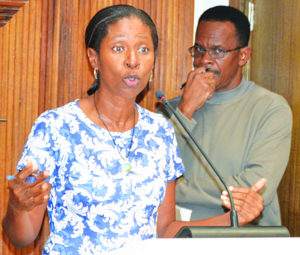
Officials from the Ministry of Finance and Economic Development including the Honourable Premier Dr, Ellis L. Webster, met on Tuesday evening with a cross section of the public to discuss a draft policy on proposed casino gaming facilities for Anguilla.
The two-and-a-quarter hour long session at the House of Assembly was emotional at times, with persons expressing their views that the island must be preserved as an unspoiled tourism attraction, with a relatively strong social fabric. Contributors felt that to introduce any semblance of casinos to Anguilla would erode that social/moral fabric of the country.
The proposed draft policy addresses matters related to casino gambling, including table games, slot machines, betting and other games of chance.
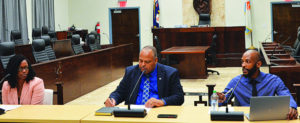
and Mr. Khari Goddard
An introduction to the policy states that the Government of Anguilla has identified that gaming plays an integral role in the tourism economy, particularly as an amenity in a form of entertainment. “As such,” the introduction continues, “the Government is desirous of creating a luxury gaming environment that limits competition locally via a regulated gaming industry. A competitive quality gaming environment will attract high gaming budget customers, and facilitate maximum tax benefits as gaming operators maximise revenues.”
However, no part of the policy met favour with those who responded during the consultation meeting. Attendees wanted to know what proposed benefits gambling would offer, in contrast to the social risks and sacrifices that would be imposed upon Anguilla’s moral and social fabric.
Even the role of the Financial Services Commission as a watchdog that would monitor gambling operations and enforce the policy, was questioned; particularly in light of the agency not performing well in monitoring and enforcing the relevant laws that governed the operations of the Madroka Anguilla Lottery. All branches of this lottery were closed a few months ago due to improper financial reporting.
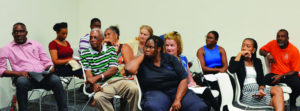
The Honourable Premier Dr. Ellis Webster stressed that a decision must be made as how to garner revenues that would be able to support the people and provide for a sound economy. He said that casino gaming could meet this need.
Respondents however, highlighted the social impacts that gambling will have on society, including how it will cause addictions; destroy families; harbor money laundering; enable criminal activities of various kinds; and make local affluent players poor.
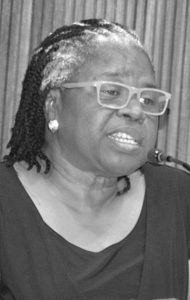
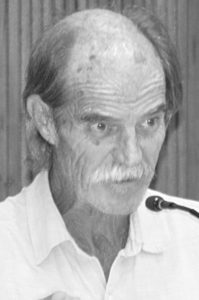
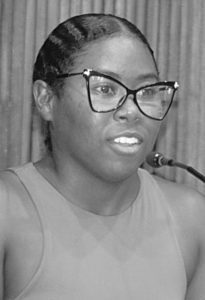
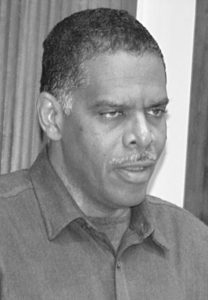
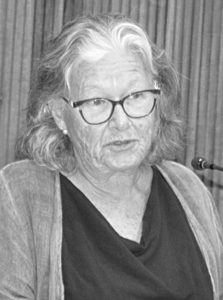
According to one speaker, there most likely will be social impacts brought on by casino gaming, but the government does not refer to them. She said social impacts will be a reality in this venture, but they are not talked about from a government point of view; and from the people of Anguilla’s perspective, that is a very, very, important thing.
She said in a recent report on the impacts of gambling, it was argued that ‘while casinos may provide jobs, their economic development impact has been overstated. While many casinos bring in jobs, they do not create greater value or a greater stock of wealth for the society which is an essential feature of economic development.
She asked if there is evidence that what the Government perceives as a gain from gambling, justifies the social disruptions and economic dislocations that gambling will bring.
It is stipulated that for this purpose, Anguillians who meet a certain financial standard would be able to register at the proposed casinos.
Another speaker noted that the venture would be attracting the most resourceful, richest, young, hard-working men who may have a couple hundred thousand dollars, a couple acres of land and a business, who will go in with the chance to lose some of their resources at the expense of the casino’s winning and the Government gaining some revenues.
She said she has a friend in Boston whose husband gambled away their house, now they are living on the street.
She pointed out that citizens will now have the potential to lose their assets that were granted to them by their grandparents and parents; and their children will have no idea as to what loses would have been triggered off upon their families in the blink of an eye in the casino.
One prominent pastor said to liken the risk of casino gambling as an investment that is similar to other inherent types of risks in other industries is somewhat callous. He said to go into deep-sea fishing with trawlers, for example, is a risk; to go into developing agriculture is also a risk; to promote our sports industry is another risk. But all of these investments bear no hurt or pain on families.
He argued that these types of investments do not damage families at all.
The pastor argued that to say casino gambling, which changes good husbands and wives into beasts, is a risk like all other risks, is farfetched. When a father or a mother blows away two thousand five hundred dollars from their service charge in one day, there are consequences – like the children going hungry.
Another attendee suggested that perhaps the way forward on the issue would be to take stock of numbers, making an analysis of the views of the people via a referendum of sorts.
“People have differing views about where we should go on issues like this, and if Government has to go and do a referendum on every issue, then there would be a paralysis of analyses that will continue to keep us back,” Premier Webster responded. “So, I think that decisions have to be made, but they have to be made after being well thought out, and, certainly, we will take into consideration all the comments that were made, but I can tell you that for every one of you that have spoken against [casino gambling], there are at least ten Anguillians who are in favour of it.”
One doctor who was present said as far back as 1967 ITV was in Anguilla and plans were being made to introduce a gambling casino here. He said people were talking about it and what would be its implications.
He said he would like to quote a then Parliamentary Member, Peter Adams who said: Quote: ‘I don’t think that would happen here, due to the religious attributes of our people.’ Unquote. The doctor said that was some fifty-six years ago, and we have moved away from that to tonight.
He said he shared a lot of the sentiments expressed and on moral and social grounds he is one hundred and ten percent opposed to legalized high-end casino gambling on Anguilla.
The doctor went on to say Anguilla is small and is already filled with serious social issues including sexual abuse, prostitution, violence, armed robbery and suicide. He said all of those stand to increase to a crisis level if and when casino gambling is introduced.
One of the most passionate responses came from the wife of a pastor who told the Premier that when persons gather as a church for prayer on any given Wednesday night, whether it is in the church building or online, they never missed praying for the Government as they are commanded to do in the scriptures.
She told the Premier it was important to share her thoughts with him because she was present in the Honourable House of Parliament asking him to listen to the people.
The pastor’s wife cautioned him to listen to those who have been praying for him. She said the scripture speaks of a ruler who had listened to the majority negatively, and the nation suffered for it.
In closing, the Permanent Secretary Economic Development, Mrs. Chanelle Petty Barrett, thanked persons for being present on Tuesday evening.
“I think it was a good consultation. Persons were able to freely give their input. We truly appreciate the sentiments that were shared,” she said. “We have been taking notes so that we can give consideration to the views that have been expressed.”








